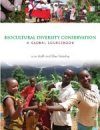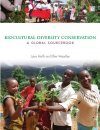By: Luisa Maffi and Ellen Woodley
282 pages, Col plates, figs, tabs
![Biocultural Diversity Conservation Biocultural Diversity Conservation]()
Click to have a closer look
About this book
Contents
Customer reviews
Biography
Related titles
About this book
The field of biocultural diversity is emerging as a dynamic, integrative approach to understanding the links between nature and culture and the interrelationships between humans and the environment at scales from the global to the local. Its multifaceted contributions have ranged from theoretical elaborations, to mappings of the overlapping distributions of biological and cultural diversity, to the development of indicators as tools to measure, assess, and monitor the state and trends of biocultural diversity, to on-the-ground implementation in field projects. This book is a unique compendium and analysis of projects from all around the world that take an integrated 'biocultural' approach to sustaining cultures and biodiversity.
Contents
Foreword by Gonzalo Oviedo, IUCN Acknowledgments Introduction: Why a Sourcebook on Biocultural Diversity? Part I: Biocultural Diversity: Conceptual Framework 1. What Is Biocultural Diversity? 2. Why Is a Biocultural Approach Relevant for Sustaining Life in Nature and Culture? Part II: Sustaining Biocultural Diversity: The Projects 3. Surveying Biocultural Diversity Projects Around the World 4. Overview of the Projects 5. Cross-cutting Analysis of the Projects 6. Lessons Learned from the Projects Part III: Sustaining Biocultural Diversity: Future Directions 7. Filling the Gaps and Connecting the Dots: Recommendations and Next Steps 8. Biocultural Diversity and the Future of Sustainability References Appendix 1: Analytical Tables Appendix 2: Survey Details Appendix 3: Survey Contributor Information Appendix 4: Directory of Selected Resources on Biocultural Diversity Appendix 5: About Terralingua Appendix 6: About the Authors
Customer Reviews
Biography
Luisa Maffi, Ph.D., is a linguist and anthropologist, and one of the originators of the field of biocultural diversity. She is co-founder and Director of the international NGO Terralingua. She is based in British Columbia. Ellen Woodley works as an ecological consultant in environment and development, specializing in issues of local and traditional ecological knowledge. She is based in Ontario, Canada.
By: Luisa Maffi and Ellen Woodley
282 pages, Col plates, figs, tabs
'All of the world's cultures are utterly dependent upon the biodiversity among which they live. Each culture has developed ways of adapting to their biodiversity, drawing on nature for goods, services, inspiration, mythology, and much else besides. 'Biocultural Diversity Conservation' is a treasure trove of the many approaches that have been taken by the world's diverse cultures to maintain the biological systems upon which they depend. This invaluable resource will certainly find great utility in all parts of the world and among many disciplines. ' Jeffrey A. McNeely, Senior Science Advisor, IUCN 'Here is a treasure trove of a book, one that will truly make a difference in the world. It represents a key milestone in our global understanding of the profound and inextricable links between cultural and biological diversity. Written by two of the leading lights in this new and growing field, it is filled with important information, case studies and analyses on a global scale.' Nancy J. Turner, University of Victoria, Canada 'At long last: an authoritative guide to biocultural conservation. This is a splendid illumination of the intermingled diversity of culture and nature ... revealing and revolutionary.' Thomas E. Lovejoy, Biodiversity Chair, The Heinz Center for Science, Economics and the Environment, USA 'Maffi and Woodley ... do a great job of communicating best practices of biocultural diversity conservation.' John Mulrow, Worldwatch Institute 'Biocultural Diversity Conservation' is an eye-operner: it sheds a whole new angle on biodiversity, culture and language in relation to the way the world is changing.' William Critchley, WASWAC. 'It is fascinating, and we, the scientific community, need to be aware of this extraordinaty and important relationship between plants, animals, culture and language.' William Critchley, WASWAC. 'The authors call for policies that value cultural diversity and creativity, empowering people, rather than distincing them from the knowledge and practices that have supported survival and adaptation over generations.' New Agriculturist. 'Biocultural diversity is a concept that had not meant too much to me before I traveled to Tofino. But the more I understood and thought about it the more sense it seemed to make. Biocultural diversity conservation--the preservation and respect of all human diversity within the diversity of the rest of life on Earth may be a good place to find solutions.' David Braun, Tofino, Canada, Natgeo Newswatch. 'This is truly a 'first resource of its kind'.' Farming Matters, December 2010




































